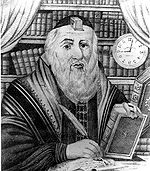Vilna Gaon, Date of Birth, Place of Birth, Date of Death
TweetVilna Gaon
Polish-Lithuanian rabbi; Mitnagdim leader in opposition to Hasidism
 Date of Birth: 23-Apr-1720
Date of Birth: 23-Apr-1720
 Place of Birth: Sialiec, Brest Region, Belarus
Place of Birth: Sialiec, Brest Region, Belarus
Date of Death: 09-Oct-1797
Profession: rabbi, Posek
Zodiac Sign: Taurus 
About Vilna Gaon
- Elijah ben Solomon Zalman, (Hebrew: ?' ????? ?? ???? ????? Rabbi Eliyahu ben Shlomo Zalman) known as the Vilna Gaon (Yiddish: ??? ?????? ?????, Polish: Gaon z Wilna, Lithuanian: Vilniaus Gaonas) or Elijah of Vilna, or by his Hebrew acronym HaGra ("HaGaon Rabbenu Eliyahu") or Elijah Ben Solomon (Sialiec, April 23, 1720 – Vilnius October 9, 1797), was a Talmudist, halakhist, kabbalist, and the foremost leader of misnagdic (non-hasidic) Jewry of the past few centuries.
- He is commonly referred to in Hebrew as ha-Gaon he-Chasid mi-Vilna, "the pious genius from Vilnius".Through his annotations and emendations of Talmudic and other texts, he became one of the most familiar and influential figures in rabbinic study since the Middle Ages, counted by many among the sages known as the Acharonim, and ranked by some with the even more revered Rishonim of the Middle Ages.
- Large groups of people, including many yeshivas, uphold the set of Jewish customs and rites (minhag), the "minhag ha-Gra", which is named for him, and which is also considered by many to be the prevailing Ashkenazi minhag in Jerusalem. Born in Sielec in the Brest Litovsk Voivodeship (today Sialiec, Belarus), the Gaon displayed extraordinary talent while still a child.
- By the time he was twenty years old, rabbis were submitting their most difficult halakhic problems to him for legal rulings.
- He was a prolific author, writing such works as glosses on the Babylonian Talmud and Shulchan Aruch known as Bi'urei ha-Gra ("Elaborations by the Gra"), a running commentary on the Mishnah, Shenoth Eliyahu ("The Years of Elijah"), and insights on the Pentateuch entitled Adereth Eliyahu ("The Cloak of Elijah"), published by his son.
- Various Kabbalistic works have commentaries in his name, and he wrote commentaries on the Proverbs and other books of the Tanakh later on in his life.
- None of his manuscripts were published in his lifetime. When Hasidic Judaism became influential in his native town, the Vilna Gaon joined the "opposers" or Misnagdim, rabbis and heads of the Polish communities, to curb Hasidic influence.
- In 1777, one of the first excommunications against the nascent Hasidic movement was launched in Vilna. He encouraged his students to study natural sciences, and even translated geometry books to Yiddish and Hebrew.
Read more at Wikipedia

